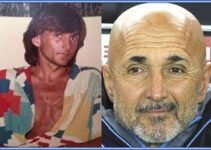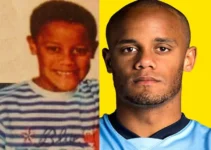Before becoming the Thomas Frank we know today at Brentford, he started as a school teacher, then coach dedicated to teaching kids how to play the game. Later, his career hit a rocky patch, with “failure” often tied to his name after a disastrous spell at Danish giants Brøndby.
Thomas Frank’s story is one of resisting pains, an act of stubbornness to change his process, and a strong appetite for doing business outside of football. He suffered a colossal failure in his journey to fame, simply because he refused to compromise his values—one who believed in nurturing players rather than punishing them.
We’ll tell you the story of a Danish coach, a loyal servant to the game who makes managing players and teams seem effortless. From being a devoted family man to coaching kids and eventually leading Brentford in the Premier League, his journey is nothing short of remarkable. And that’s the story we’re here to share.

A Closer Look at Thomas Frank’s Personal and Professional Life. Image Credit: EuroMan.
Despite enjoying success in the world’s top football league, Frank’s path hasn’t always been smooth. Years ago, he was on the brink of losing his job at Brentford. Though Frank seemed stubborn in sticking to one process, he knew when to listen, especially during tough times. We’ll tell you how an old friend from his childhood in Hvidovre reached out with advice that saved him from being sacked. Today, Frank follows that advice from Teddy Hebo, his childhood friend, and he is celebrated for his leadership, built on strong bonds with his players.
This story dives into Thomas Frank’s life, exploring his early years, family roots, dark years as a coach and his eventual rise to stardom. Without further delay, let’s delve into the inspiring journey of this exceptional coach.
Early Years:
Thomas Frank was born on October 9, 1973, to his parents, Mr. and Mrs. Preben Frank, in Frederiksværk, a quaint Danish town nestled in Halsnæs Municipality on the island of Zealand, within Region Hovedstaden. He grew up surrounded by the small-town charm of Frederiksværk, a place known for its tight-knit community and commitment to preserving traditions.
Thomas had a relatively smooth and happy upbringing, thanks to the unwavering support of his parents, who played a significant role in shaping his values and character. Sadly, this foundation of parental love faced a loss in March 2024, when Thomas’s father, Mr. Preben Frank, passed away. Despite this profound personal loss, Thomas’s upbringing instilled resilience and a deep connection to his Frederiksværk roots, which continue to influence his life and career.
Knowing Him Beyond the Game:
Thomas Frank didn’t come from a family with a rich footballing background. Surprisingly, he never had a professional playing career. Before stepping into coaching, Thomas worked as a teacher. He taught at Ishøj Business School, an educational institution in Ishøj, Denmark, where he helped shape young minds before discovering his passion for coaching kids.
In December 2016, Thomas made a significant move to London to pursue his dreams. Before that, he and his family lived in Hvidovre, Denmark, a place that held many memories and connections for him.
Before Thomas Frank rose to fame with Brentford, he was known more as a businessman and teacher. Above all, he is a devoted family man. He is married to Nanna Theil, and together they have three children: Freja (born in 2002), Bertram (born in 2003), and Alba (born in 2006).
The family lived happily in Copenhagen, Denmark’s vibrant capital and most populous city. It was there that Thomas found the support and opportunity to pursue his coaching dreams, laying the foundation for the success he enjoys today.
At his core, Thomas Frank is deeply committed to his family and prioritizes meaningful moments with those he cares about. Fridays are typically dedicated to family dinners, a tradition that highlights his strong commitment to those nearest to him.
One such evening, Frank was spotted enjoying dinner with his family at the popular Italian restaurant Villa di Geggiano in Chiswick. The restaurant was thrilled to host him and shared the moment on social media, writing:
“As the new football season approaches, it’s great to see Thomas Frank, taking some time off and relaxing at the Villa with his family.”
Loved and admired wherever he goes, Thomas Frank’s approachable and warm nature continues to endear him to fans and the public alike.

Quality family time! Thomas Frank, alongside his wife Nanna and their children, enjoying a cozy dinner at Villa di Geggiano in Chiswick. Image: Villa di Geggiano
A Strong Appetite for Business:
Beyond coaching, Thomas Frank and his wife, Nanna, are known for their strong business sense. Together, they co-own Theil Frank Holding ApS, a private limited company based in Risskov, Aarhus, Denmark. Founded on March 7, 2023, the company focuses on owning shares and making investments as determined by its management. Despite his busy football career in England, one thing is clear—Thomas Frank maintains a deep connection to Denmark.
Brentford coach Thomas Frank has also partnered with former Danish national coach Kasper Hjulmand in business. Since 2018, the two have co-owned Sports Advisors ApS. The company focuses on buying, selling, managing assets, shares, and units in Danish and foreign companies. It also specializes in developing and sharing knowledge in sports and management.
Family Origin:
Thomas Frank hails from Frederiksværk, a town often called the birthplace of Denmark’s Industrial Age. Known for its historic gunpowder mill, founded in 1756, Frederiksværk played a key role in Denmark’s military supply during the Napoleonic Wars. The town, surrounded by peaceful landscapes and rich birdlife, is also a haven for nature enthusiasts. Here’s a map marking the roots of Thomas Frank.
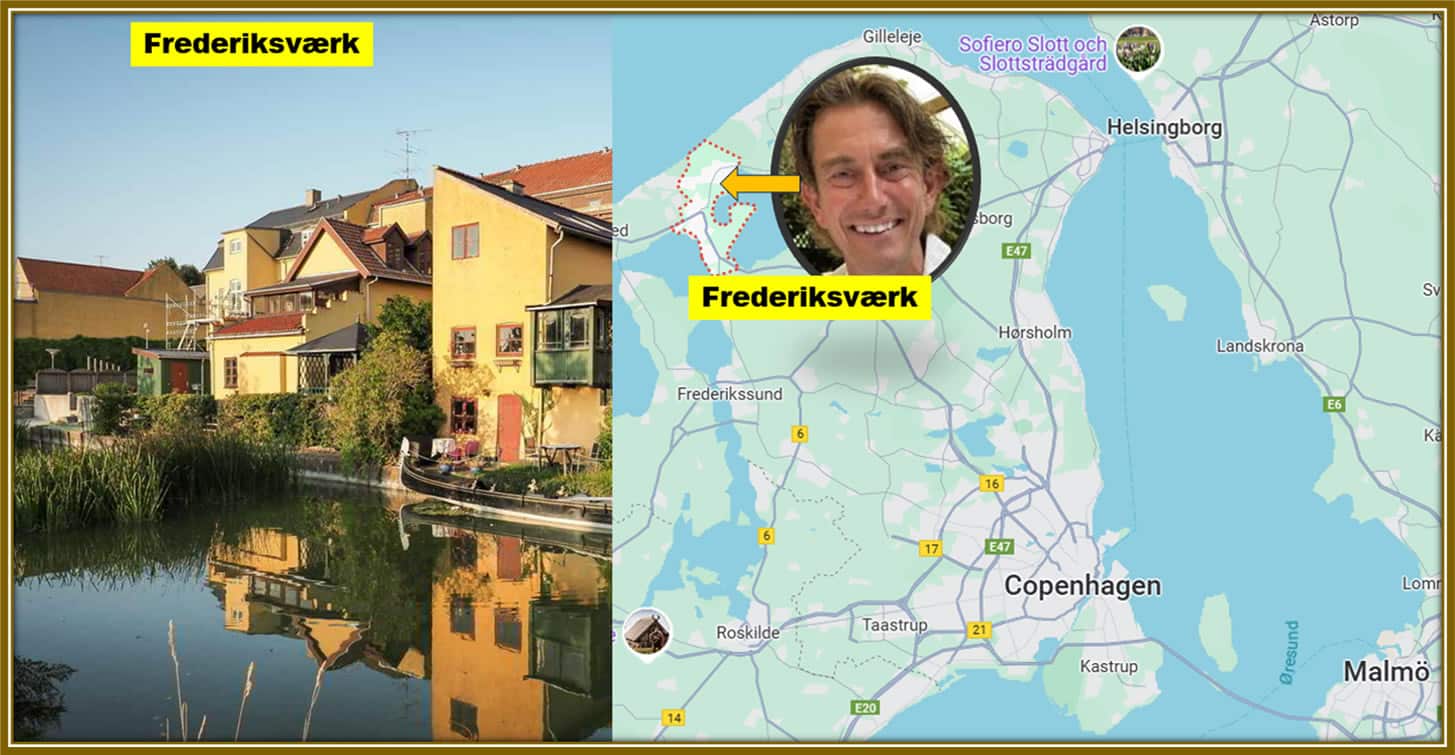
Exploring Thomas Frank’s roots: A map highlighting Frederiksværk, the birthplace of the Brentford manager. Photo: GoogleMap, Ann Jørgensen
Ethnicity:
Thomas Frank is of Danish ethnicity, with both of his parents hailing from Denmark. Growing up in Frederiksværk, a town rich in Danish history and culture, his heritage is deeply rooted in the traditions and values of Denmark. Similar to Rasmus Højlund, he is also Scandinavian, as Denmark is part of the Scandinavian region.
What is His Educational Background?
Brentford’s manager, Thomas Frank, has a strong educational background. After finishing secondary school, he went on to university. In 1999, he obtained a BSc Bachelor’s degree in Sports Science and Physical Education from the Institute of Sports Medicine in Copenhagen. During his studies, he specialized in Sports Pedagogy and Sports Psychology.
Thomas Frank didn’t rush into coaching. From 2002 to 2005, he focused on further education, studying coaching-based leadership at the University of Copenhagen’s Department of Sports and Recreation. During this period, he worked as a kindergarten teacher and later taught at Ishøj Business College. He left the college in 2004, a year before completing his studies.
Early Career:
Did Thomas Frank play professional football? The answer is no. The Danish coach had a brief playing career as an amateur midfielder before deciding to focus on coaching young players. In 1995, he took his first coaching job, working with the Under-8 and Under-12 teams at Frederiksværk Football Club, his hometown team. This marked the start of his coaching journey.
Frank continued at Frederiksværk until 1998. By 1999, he was coaching the Under-14 to Under-18 teams at Hvidovre IF, a football club in Denmark’s Capital Region. His progression saw him move from Frederiksværk to Hvidovre in 1998, then to B93 in 2004, and finally to Lyngby in 2006. His path reveals a steady climb through youth football, laying the foundation for his later success.
In 2005, Thomas Frank earned the qualification to coach youth players for Denmark’s national team while working with ITU trainer B93. That same year, he began a new chapter in his career by accepting a coaching position at Lyngby Boldklub.
Frank’s expertise quickly caught the attention of the Danish Football Association, which hired him to coach Denmark’s U16 team. That year, he also earned his DBU P-License, building on the DBU A-License he had obtained in 2002.
Job with Denmark’s Youth:
In 2012, Frank returned to coaching Denmark’s U16 and U17 teams, roles he had previously held from 2006 to 2008. During this period, he achieved a major milestone by guiding Denmark’s Under-17 team to the 2011 European Championships, further cementing his reputation as a skilled youth coach.
Thomas Frank achieved significant milestones with Denmark’s youth teams during his time with the Danish Football Association (DBU). He led the U17 team to reach the Euro U17 Championship final for the first time in eight years. Though his team advanced to the semi-finals, they fell short, losing 2–0 to Germany. Frank also guided Denmark to its first-ever U17 World Cup appearance, but the team was eliminated in the group stage.
Following these successes, Frank was promoted to manage the Denmark U19 team in July 2012. Unfortunately, his tenure with the U19s was less successful, as the team failed to qualify for the 2013 European U19 Championship.
While working with the DBU, Frank took on various responsibilities. He managed an unofficial U18 match in 2010 and stepped in for Morten Wieghorst to lead a U20 match in 2012. Additionally, he occasionally served as an assistant for the U18, U17, U16, and women’s U17 teams.
After his time with the DBU (the governing body of football in Denmark), Frank decided to take on the greatest challenge of his career: coaching a Premier League team, a move that showcased his ambition and dedication to the sport.
The Root of His Early Coaching Troubles
Thomas Frank didn’t move to coach Brentford just because of his success with youth teams. Before joining Brentford in 2016, his path to the top leagues didn’t seem likely. In fact, failure was closely tied to his career, especially after a tough stint at Danish giants Brøndby.
Frank became Brøndby’s head coach in the summer of 2013 during a difficult period for the club. It was his first senior coaching role, as he had only coached youth teams up until then, where he had found great success. However, he quickly realized that managing a senior team at a big club like Brøndby would be a much tougher challenge than he expected.
In the 2012/13 season when Thomas Frank started, Brøndby had just avoided relegation in the final fixtures. The club had also narrowly escaped bankruptcy, thanks to new ownership stepping in. Frank’s main task was to rebuild the club from the ground up. He earned the job because of his strong rapport with young players at his previous roles. With his experience as a youth coach and close connections to several younger players, he was seen as the perfect fit for the job.
Brøndby lost Talents:
Before Thomas Frank joined Brøndby as coach, the club had lost several promising talents to foreign clubs. Some of these players never made it to the first team before being sold to top European clubs simply because they were so talented. Notable names include Andreas Christensen, who joined Chelsea, Pierre-Emile Højbjerg, who was bought by Bayern Munich, and Jannik Vestergaard, who moved to Hoffenheim.
Thomas Frank was unhappy with the club’s tendency to sell young talent. He voiced his frustration to the board, and they agreed to change this approach. Together, they worked to break the trend of selling off young players too early. They made sure all of Brøndby’s promising youngsters had the chance to reach the first team. This not only allowed the club to maximize the potential of their best talents but also ensured they could profit more from their eventual sales.
When Broken Promises Came with Trust:
Brøndby’s management’s promise to avoid selling youth players turned out to be just empty talk. Midway through Frank’s first season, they introduced a new, more ambitious academy called Brøndby Masterclass, aiming to generate revenue from selling youth players. The club invested millions of kroner and hired foreign coaches, including several from Barcelona’s La Masia, to strengthen both the staff and the academy’s expertise
Although the new Brøndby board was ambitious, they were also patient, having learned from past mistakes. They had a strong belief in Thomas Frank and promised not to sack him quickly or make frequent managerial changes. In fact, Frank was given an unprecedented level of trust by chairman Aldo Petersen, who said:
“Frank joined our club. I promise there won’t be changes in coaches if our strategy doesn’t go as hoped in the future.”
Club Chairman Petersen even guaranteed that Frank wouldn’t lose his job if results were underwhelming, as long as he remained chairman. He explained to Frank that the club wanted a long-term strategy and was willing to accept relegation to the second tier if it meant progress was still being made on that plan.
Signs of Early Failure and Quick Rescue:
The trust placed in Frank was crucial, as Brøndby didn’t start well under his leadership. After seven games in the Danish Superliga, his team was still winless. To make matters worse, Frank’s side was embarrassingly knocked out of the cup by a semi-professional team. Following that loss, Brøndby’s chairman realized reinforcements were needed. He invested heavily in the club, bringing in experienced players like Thomas Kahlenberg and Khalid Bouhlarouz to strengthen the team.
At that time, Thomas Frank’s team had talented but inexperienced players like Christian Nørgaard (who later followed him to Brentford), Kenneth Zohore, and Riza Durmisi. Thankfully, the new signings made a difference. Their addition raised the team’s performance. With better leadership shown on the football pitch, results improved, and Brøndby finished fourth, qualifying for European football for the first time in three years.
When Change Took Everyone by Surprise:
A shift in Brøndby’s management structure occurred when Jan Bech Andersen acquired a controlling stake in the Danish club and took on the role of chairman. With new ownership came a shift in ambition. The focus changed from patient development, youth team growth, and following agreed processes to chasing titles. The new owners wanted immediate success.
In addition to chasing titles, Frank’s Brøndby team was given the task of closing the growing gap to arch-rivals København. This period of change coincided with the club’s 50th anniversary, which brought even higher expectations. Brøndby was now expected to start winning titles and competing in Europe.
Initially, the plan was to let young players progress from the Brøndby academy to the senior team and mature there. However, a new approach emerged. Brøndby’s new owner, Jan Bech Andersen, spent heavily in the transfer window to bring in big names.
Did you know? Brøndby broke their transfer record by signing Liverpool legend Daniel Agger, who returned home to finish his career. Other big-money signings included Norwich legend Teemu Pukki and Brøndby’s own Johan Elmander, a member of the 2004/2005 double-winning team under Michael Laudrup. With these arrivals, the club’s goal shifted from finishing in the top three to challenging for and winning the title.
New Leadership:
The significant investment by Jan Bech Andersen, the new Brøndby chairman, didn’t help. In fact, it made things worse, especially on the pitch. Poor Thomas Frank and his team were easily beaten by smaller clubs. Their first major humiliation came during Europa League qualification, where they were thrashed 5-0 on aggregate by a strong Club Brugge side. At home, things weren’t much better. Inconsistent results became the norm. Without the ability to win, especially against their biggest rivals, all the money and efforts spent on the club seemed like a huge waste.
Although Frank did his best and tried to control ball possession with his 4-2-3-1 formation, Brøndby struggled to create chances. Even against the worst team in the Danish league, they couldn’t produce good opportunities. Scoring a goal felt like a battle, and when they did score, it was often thanks to individual talent rather than team effort. During this time, Brøndby lost its identity on the pitch, and it became clear that no strategy was working for the team.
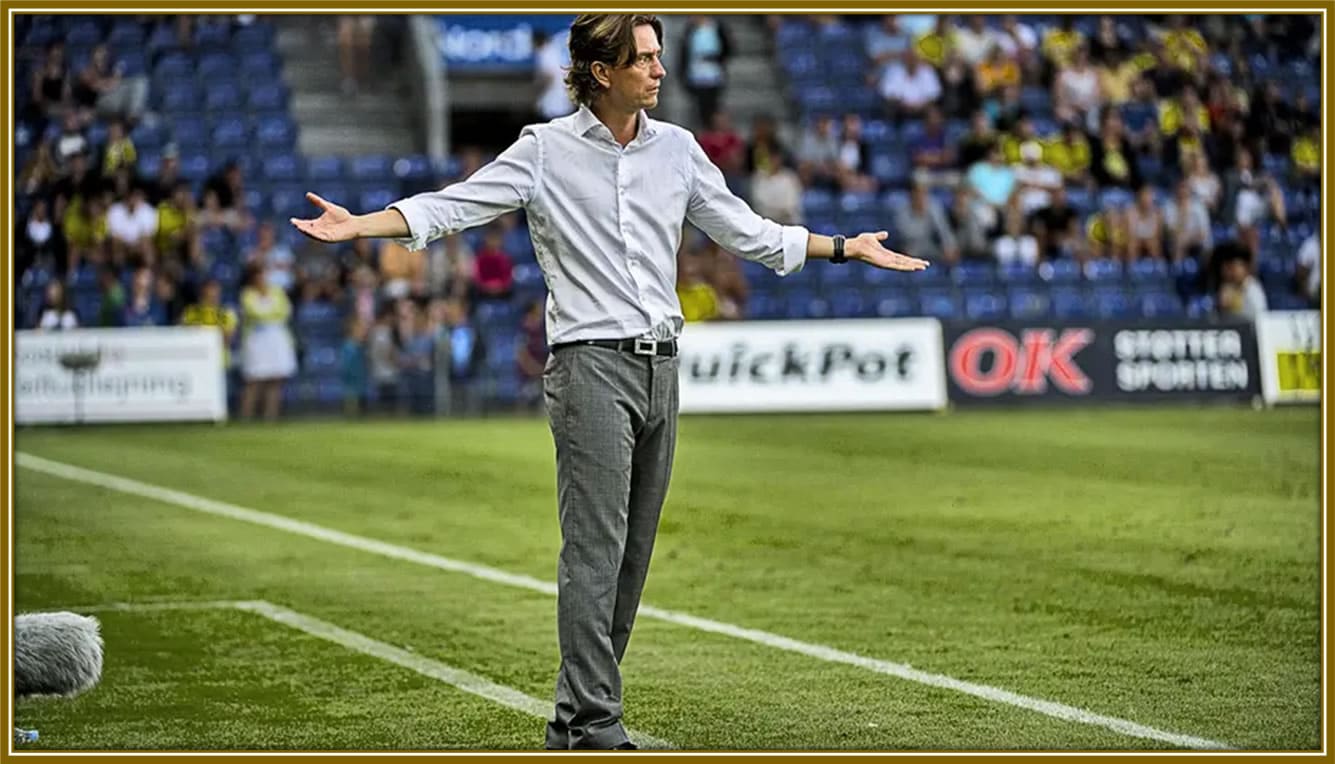
The Danish coach, during a challenging day at Brøndby, balancing the weight of expectations while pushing through the tough times. Credit: Jakob Jørgensen
New Troubles:
Every time Frank’s Brøndby team played, he looked helpless on the sidelines, despite being a likeable figure. Even with the poor results, he remained popular among Brøndby fans due to his good communication skills and leadership style. However, as the losses piled up, cracks began to show. The pressure grew, and there was a need to find a scapegoat to take the blame.
The frustration from Brøndby fans grew, and they created a chant to express their anger over the team’s back-to-back poor results. During this time, Thomas Frank appeared even more helpless. Questions were raised about Frank’s ability to lead a big club like Brøndby and motivate the experienced players. Some reports suggested he was too nice to the players, and his kind, gentle nature made it difficult for him to discipline them or change their poor playing habits. This only added to the pessimism and negativity among the club’s fans.
When it became too much to handle:
The question of whether Thomas Frank could manage a club like Brøndby grew louder during a tough winter break. His team was crushed 7-0 by the German club Hoffenheim. The defeat was devastating. The press and everyone at the club felt Frank needed help to handle the embarrassment. Before the humiliating match, Brøndby’s chariman had appointed their senior player and captain, Daniel Agger who was nearing retirement, to step in and advice Frank on how to punish the team for their poor performance.
Thomas Frank was seen as too lenient with his players, and Daniel Agger, the team’s most senior and respected player, took on a more dominant role. After the heavy 7-0 loss, Agger, now retired, spoke with Frank. He said,
“You know we’ve talked about consequences and how players should be punished. So, what are you going to do now, Frank?” He continued, “We lost 7-0, and many of our players didn’t perform well. Maybe we’re not in shape, but mentally, we were wrong too.”
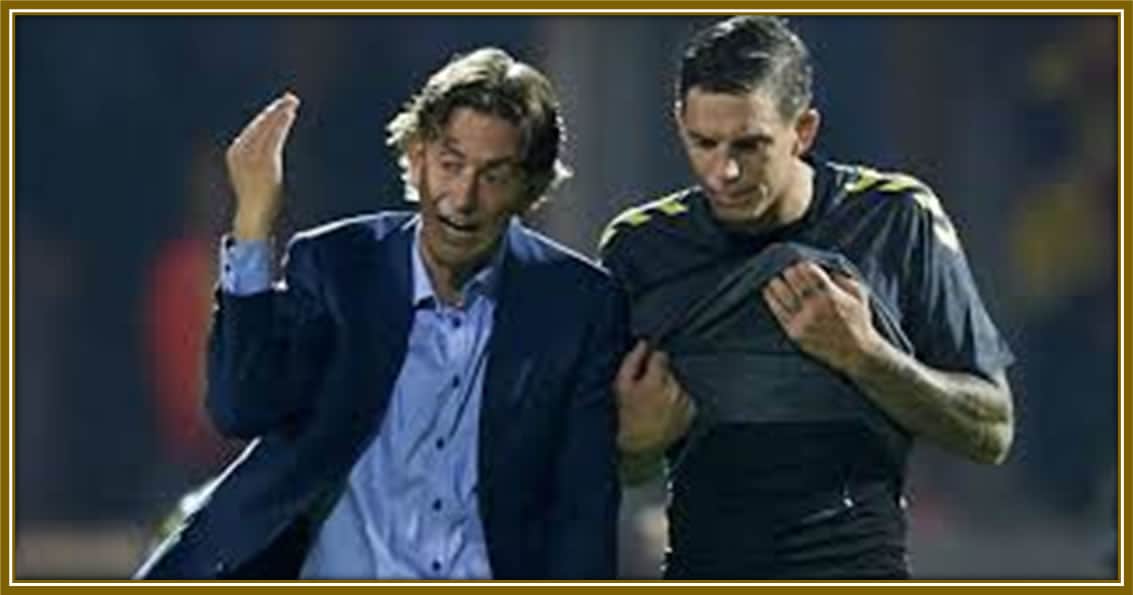
Thomas Frank vents his frustrations while Daniel Agger listens attentively, offering advice that Frank chooses not to follow. Image: tipsbladetDK.
Agger suggested that Frank punish the players by preventing them from going on holiday and calling them back to training during the break. With the club chairman’s support, Agger believed the players needed harsh discipline. He proposed that the players show up for training with only their running shoes and then be sent to the Brøndby forests to run all day. Frank did not agree with Agger and he refused to follow through with the idea, feeling it was too extreme. Agger responded,
“Of course, you can disagree, but this is the only way these players will get it. If I were the coach, I’d tell them to show up in the morning with only their running shoes, and we’d head to the Brøndby woods.”
Did Frank finally punish his players?
Thomas Frank eventually tried to follow his captain’s advice, but his soft approach made it difficult for him to enforce the punishment as planned. Some players, who wanted stricter discipline, didn’t respond well to his gentle style. In 2017, Daniel Agger was asked by Ekstra Bladet about Thomas Frank’s character, and he said:
“As an individual, I really liked Frank, but as a coach, he wasn’t my favourite. I’m from the old school, where a football team is built on discipline and hierarchy, but that wasn’t the case when I returned to Brøndby.”
Despite everything, what saved Frank’s job? His soft-hearted nature helped him connect with his players. He spoke to them about improving, and they listened. His Brøndby team finished third in the Danish league, meeting the club’s minimum goal for the season. However, this wasn’t enough to impress many. Both fans and management were still calling for his dismissal. Brøndby finished 16 points behind first-place FC Midtjylland, scoring just 43 goals in 33 league games, which was considered very poor.
Things Got Worse Again
The following season, Brøndby aimed to avoid the disaster of their previous Europa League campaign. Unfortunately, it ended in another embarrassment. Thomas Frank’s team suffered a 6-1 defeat to Greek side PAOK. Back in the Danish League, things didn’t improve. Brøndby found itself in the bottom half, with hopes of winning the title fading fast. During this time, support for Thomas Frank reached an all-time low. Despite big-name signings and millions of kroner spent, Brøndby struggled with striking problems, and many saw it as a waste. While some still called for patience, questions about Frank’s capabilities grew louder among fans and pundits.
How did Thomas Frank get sacked:
In the dark winter days of 2016, an anonymous person created an account on the Brøndby forum, Sydsiden Online, which included members from the club’s fans. Using the username “Oscar,” he heavily criticized Thomas Frank and Brøndby’s sporting director, Per Rud, posting messages like:
“Per and Thomas made so many terrible decisions because of ignorance and inexperience. We can’t point to a single signing that has been respectable, and Thomas’ inability to integrate the new players he personally picked is pathetic and unacceptable. Another coach could get more out of this Brøndby squad, and the club is focused on this. I’m sure we’ll see changes soon. Having an inexperienced head coach like Thomas Frank who insists on sticking to an ineffective system creates a recipe for disaster.”
These messages made many fans on the forum wonder, “Who is this user… Oscar?” In March 2016, shortly after the spring season began, the user’s identity was finally revealed. Fans were shocked to learn that the person behind those comments was none other than Jan Bech Andersen, Brøndby’s chairman.
Unsurprisingly, Thomas Frank decided to quit shortly after receiving criticism from chairman Jan Bech Andersen, who had used the pseudonym “Oscar” on an online supporters’ forum. At the time of his resignation, Brøndby was in fifth place in the league and had just suffered a 3-1 defeat to SønderjyskE. Frank chose not to seek another job immediately and instead took a nine-month break from football to clear his head and spend time with his family. Jan Bech Andersen’s use of a pseudonym had serious consequences. He resigned as Brøndby’s president after being caught criticizing his own coach on the fans’ forum.
Lessons Learnt by Frank:
Months passed without a new job after his departure from Brøndby, as Thomas Frank chose to take time off and clear his mind. While his time at Brøndby didn’t reach the expected heights despite the significant investment in the squad, it was clear that Frank learned a lot. Daniel Agger himself observed how Frank became tougher on his players over time. Tactically, Frank adapted and became more pragmatic, focusing on his opponents rather than stubbornly sticking to one system. The painful experiences at Brøndby taught Frank valuable lessons about the tough world of professional football, especially for someone with no prior senior coaching experience.
Frank’s Path to Fame:
After nine months, Thomas Frank applied for coaching jobs abroad and was offered the assistant coach position at Brentford in December 2016. He worked under head coach Dean Smith, who later moved to Aston Villa. When Frank first joined Brentford and signed a 2.5-year contract, he was relatively unknown in the UK. Frank’s role was to act as a “bridge” between the players and the coaching staff. Additionally, Brentford’s co-director of football, Rasmus Ankersen, assigned him the task of managing the development of young players transitioning from the B team to the first team, ensuring they had a clear pathway.
On 16 October 2018, after Dean Smith’s departure, Brentford owner Matthew Alexander Benham appointed Thomas Frank as head coach. Frank took over a club in mourning after the death of technical director Robert Rowan. His start was difficult, winning only one in his first 10 games. This led to rumours he might be sacked and questions about when he would lose more games. The pressure was intense, with fans, management, and the media all hoping he wouldn’t fail again.
Calling an old friend made a difference:
When Teddy Hebo, Frank’s childhood friend, came home from work and saw him on TV, looking sad after a defeat, he felt the need to reach out. At that time, Frank was struggling with eight losses in 10 games. Hearing the commentary about his struggles on TV, Teddy turned to his wife, Bente, and said, “Bente, you know what? I think Thomas is sweating. I’m going to give him a call.”
Teddy was right, and his call changed Frank’s life. He picked up the phone and called the stressed man he had seen on TV, getting through to him. Frank and Teddy were like brothers. Teddy joked that Frank was like a duck in a pond, calm on the surface, but paddling furiously underneath to stay afloat in his Brentford job.

Teddy Hebo, Thomas Frank’s close childhood friend and trusted advisor. Image: livingcities
Changing his Habits:
In his effort to improve, the struggling Brentford coach had a life-changing conversation with his old friend, Teddy Hebo, who often gave Frank valuable advice as a big brother. Teddy carefully looked into what was wrong and concluded that Frank should leave the training facility by 4 p.m. instead of 5 p.m., regardless of whether his work was done.
When Frank returned home, he realized he needed time off to disconnect completely from football. Teddy Hebo also advised him to hire an assistant and implement other changes that would make a difference. Reflecting on his turnaround with Brentford in an interview with Euroman, Frank said:
“If you were to think of me as a battery, I went from very low percentages to 80 percent. I never got to 100 percent, but the small adjustments kept me going until the holidays. All thanks to my friend Teddy Hebo.”
It’s important to note that Teddy Hebo has never played football professionally. He is an expert in the Danish pharmaceutical industry and specializes in political negotiation and cultural transformation. He has known Thomas Frank since their days in Hvidovre. Teddy helped Frank adapt his approach to daily life to avoid burnout. He taught him how to manage his time and energy, sorting out which people to prioritize without draining himself.
The Turn Around:
While Teddy Hebo was advising Frank, his family had just bought a house in East Sheen and were in the process of moving. The added pressure took its toll on Thomas. Despite sleeping for hours, he was always tired. His patience was wearing thin, and he found himself snapping at those around him. Eventually, he called Teddy Hebo again to talk about his burnout.
A big change came when Frank hired his personal assistant, Michelle. She took care of his calendar and handled most of the meeting notes. This allowed him to focus on what mattered most: football and family. He also developed a habit of reading for 20 minutes each night before bed, which helped him find peace of mind.
Following his friend’s advice, things quickly started to improve for Frank. He made good use of his strikers, like Ollie Watkins and Neal Maupay, who helped the team perform at its best. Chiedozie Ogbene and Rico Henry were already key players. In the 2019/2020 season, Bryan Mbeumo arrived from Troyes, and David Raya joined from Blackburn.
Frank’s former Brøndby star, Christian Nørgaard, also played a key role. After finding his energy again, he helped Frank and Brentford secure promotion to the Premier League for the first time in the club’s history in the summer of 2021. Ivan Toney‘s arrival in 2020 from Peterborough formed a powerful strike partnership with Bryan Mbeumo, lifting the club to new heights.
With his success at Brentford, Thomas Frank won multiple awards, including the London Football Awards Manager of the Year (2020) and DBU Coach of the Year (2020, 2022), among others. The rest, as they say, is history.
Endnote:
Thomas Frank’s journey to Premier League success with Brentford FC is one of football’s feel-good stories in recent years. Born in Denmark, his early years in football were shaped by his work with youth teams, including his role as coach of Denmark’s Under-17s. His dedication to the game was clear even then, as he meticulously planned each phase of play, ensuring his players understood both their roles and the team’s strategies.
Frank’s rise took a leap when he joined Brøndby IF, where he faced challenges that tested his leadership and ability to adapt. Initially, he struggled with the demands of senior football, but over time, he refined his approach and became known for his collaborative style and attention to detail. Despite his hard work, Brøndby’s inability to capture the Superliga title led to criticism, but Frank’s belief in a long-term process remained unwavering.
In 2016, Frank moved to Brentford as an assistant coach, and in 2018, he was appointed head coach. His first months were difficult, with Brentford struggling in the league and rumours of his imminent sacking. It was during these tough times that he turned to his old friend, Teddy Hebo, for support. Hebo helped Frank refocus his energy and improve his leadership skills, making crucial adjustments to his daily routine.
With Hebo’s guidance, Frank learned to balance coaching with his personal life. He focused on his family and found ways to conserve his energy. Despite his success, he stays humble and continues to focus on Brentford’s future. Over the course of his career, Frank has faced many challenges, making his story one of the most inspiring managerial journeys in football.
